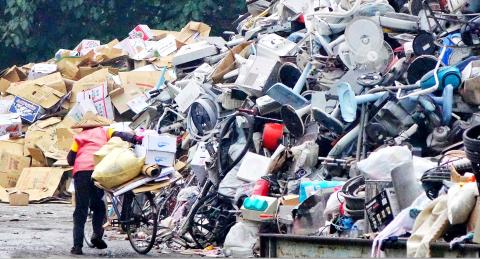Towering piles of recyclable materials awaiting processing are nearing crisis levels in some parts of the nation, public health officials and industry sources said.
Contractors are shying away from buying recycled household scrap collected by the Yunlin County Government, and recycling centers in the county’s Gukeng (古坑), Huwei (虎尾), Dounan (斗南) and Tapei (大埤) townships, among others, are unable to find buyers for their huge piles of scrap, industry sources said.
The crisis is largely due to plunging scrap prices making government scrap tenders unprofitable, industry sources said.

Photo: Liu Hsin-de, Taipei Times
Gukeng Township Mayor Huang Yi-ling (黃意玲) said that she was forced to move scrap that the recycling center could no longer accommodate to the local public basketball court, following the township’s second consecutive lapsed tender.
The township could not find any takers for the contract in spite of reducing prices from NT$1 per kilogram to NT$0.5, she said.
Similar problems have been reported by many other centers in Yunlin County.
In 2014, Huwei Township’s recycling center tried to sell its scrap by reducing prices to NT$2.21 per kilogram. However, the scrap not only failed to attract new buyers, but in September last year, an existing buyer decided to prematurely terminate a contract even though the buyer was obliged by contract to purchase Huwei’s scrap until the end of that year.
A spokesperson from the buyer said the firm lost between NT$100,000 and NT$200,000 every month it did business with the township, and that it saw no way out other than to tear up the contract and pay a NT$200,000 penalty.
Yunlin is not alone in having trouble finding buyers for scrap.
Keelung’s Bureau of Environmental Protection Director-General Lai Huang-hung (賴煥紘) said that the city also saw multiple tenders for the city’s scrap contract lapse until it finally found a buyer this year.
More than 100 Taiwanese scrap-trading businesses stopped operating last year due to falling prices, which industry sources attribute to the deregulation of scrap steel and iron imports from China and cutbacks on Environmental Protection Administration (EPA) subsidies.
The price of recycled paper has remained “relatively stable,” declining from NT$5 per kilogram to between NT$3 and NT$4, said a recycler based in Yunlin, who has been in the industry for more than 30 years.
“However, in metals and plastics, the changes are significant. About seven to eight years ago, the price of scrap steel peaked at between NT$11 and NT$12 per kilogram, but Chinese scrap iron and steel imports pushed the price down to NT$1 per kilogram. The recent rise to NT$3 per kilogram does not make the remotest difference to the industry,” said the recycler, who wished to remain anonymous.
The EPA’s reduction of subsidies for plastic bottles drove prices for plastic down to NT$5 per kilogram — about 20 average-weight bottles — whereas previously the price for a single bottle was NT$1.
The accumulation of unsold scrap in Yunlin’s recycling centers could provide an ideal breeding ground for disease-carrying mosquitoes when temperatures rise in the spring and summer, the Yunlin County Environmental Protection Bureau said.
Yunlin collects more than 6,000 tonnes of recyclables from county households every month, it added.

CHAOS: Iranians took to the streets playing celebratory music after reports of Khamenei’s death on Saturday, while mourners also gathered in Tehran yesterday Iranian Supreme Leader Ayatollah Ali Khamenei was killed in a major attack on Iran launched by Israel and the US, throwing the future of the Islamic republic into doubt and raising the risk of regional instability. Iranian state television and the state-run IRNA news agency announced the 86-year-old’s death early yesterday. US President Donald Trump said it gave Iranians their “greatest chance” to “take back” their country. The announcements came after a joint US and Israeli aerial bombardment that targeted Iranian military and governmental sites. Trump said the “heavy and pinpoint bombing” would continue through the week or as long

TRUST: The KMT said it respected the US’ timing and considerations, and hoped it would continue to honor its commitments to helping Taiwan bolster its defenses and deterrence US President Donald Trump is delaying a multibillion-dollar arms sale to Taiwan to ensure his visit to Beijing is successful, a New York Times report said. The weapons sales package has stalled in the US Department of State, the report said, citing US officials it did not identify. The White House has told agencies not to push forward ahead of Trump’s meeting with Chinese President Xi Jinping (習近平), it said. The two last month held a phone call to discuss trade and geopolitical flashpoints ahead of the summit. Xi raised the Taiwan issue and urged the US to handle arms sales to

State-run CPC Corp, Taiwan (CPC, 台灣中油) yesterday said that it had confirmed on Saturday night with its liquefied natural gas (LNG) and crude oil suppliers that shipments are proceeding as scheduled and that domestic supplies remain unaffected. The CPC yesterday announced the gasoline and diesel prices will rise by NT$0.2 and NT$0.4 per liter, respectively, starting Monday, citing Middle East tensions and blizzards in the eastern United States. CPC also iterated it has been reducing the proportion of crude oil imports from the Middle East and diversifying its supply sources in the past few years in response to geopolitical risks, expanding

Pro-democracy media tycoon Jimmy Lai’s (黎智英) fraud conviction and prison sentence were yesterday overturned by a Hong Kong court, in a surprise legal decision that comes soon after Lai was jailed for 20 years on a separate national security charge. Judges Jeremy Poon (潘兆初), Anthea Pang (彭寶琴) and Derek Pang (彭偉昌) said in the judgement that they allowed the appeal from Lai, and another defendant in the case, to proceed, as a lower court judge had “erred.” “The Court of Appeal gave them leave to appeal against their conviction, allowed their appeals, quashed the convictions and set aside the sentences,” the judges